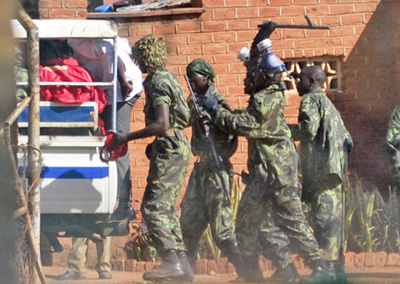New York, July 21, 2011—The Committee to Protect Journalists condemns sweeping arrests and attacks on journalists, as well as censorship by the administration of Malawi President Bingu Wa Muthiraka against media outlets reporting on nationwide antigovernment protests that erupted on Wednesday.
Police arrested a contributor to Nyasa Times, a U.K.-based online news site critical of the government, journalist Collins Mtika, today as he covered protests in the northern city of Mzuzu, according to local journalists. Mtika remains held without charge on anti-government accusations. Vitima Ndovi, a freelance journalist in the capital, Lilongwe, was also arrested today and remains in custody. Police assaulted and briefly detained reporter Kingsely Jassi of private media group Blantyre Newspaper Limited after he took photos of officers beating a man, according to Independent Nation reporter Kondwani Munthali.
In response to the unrest, today the state-run Malawi Communications Regulations Authority (MACRA) switched off the signals private broadcasters Joy Radio, Capital Radio, and MIJ FM, for about four hours, Joy lawyer Ralph Kasambara told CPJ.
Kasambara told CPJ that a letter to broadcasters from MACRA on Wednesday ordered stations to “desist” from live broadcasts of the protests “in the interest of the security of the nation.” It also said that such coverage “may incite violence which can lead to gross damages to property, and even loss of life.”
Anthony Kasunda, chairman of the Malawi chapter of the Media Institute of Southern Africa, which monitors airwaves, told CPJ that the station’s live coverage was vital in informing the public about security conditions.
As many as 18 people are reported to have died in nationwide anti-government demonstrations since Wednesday as a defiant Mutharika accused the protesters of “being led by Satan.” The demonstrations, originally authorized by police but later banned by court injunction, are against fuel shortages, high unemployment, deteriorating economy, and growing authoritarianism by Mutharika, who was first elected in 2004, according to news reports.
“The government must end this brutal crackdown and censorship immediately,” said CPJ Africa Advocacy Coordinator Mohamed Keita. “Pulling the plug on radio stations at a time of civil unrest is not only an act of desperate censorship but deprives all citizens of access to necessary information. The authorities must rein in security forces and immediately release all jailed journalists.”
On Wednesday, Munthali told CPJ he saw a police officer attack freelance journalist George Thawe, hitting him with the butt of a gun six times despite Munthali’s efforts to identify Thawe as a journalist. Munthali was among a group of nine journalists who were later beaten by police in a church in Lilongwe, he said. Photojournalist Amos Gumulira from the Nation and reporter Isaac Kambwiri from Capital Radio received severe head injuries and were rushed to the central hospital, local journalists reported. Others assaulted included Emmanuel Simpokolowe of pro-government Guardian Publications, Nathan Majawa of 101 FM, George Mkandawire of Joy FM, photojournalist Jacob Nankhonya of Blantyre Newspapers Limited, Elijah Phimbi of online news site Malawi Voice, and freelancer Precious Msosa, according to local journalists.
Also on Wednesday, police beat private Joy FM journalist Rebecca Chimjeka, causing internal bleeding in her ear, local journalists told CPJ. She was rushed to the hospital.
Nyasa Times was inaccessible in Malawi from July 18 until today, according to local journalists. Nyasa Times Managing Editor Edgar Chibaka told CPJ the website has experienced massive and repeated distributed denial of service (DDOS) attacks since July 19, which brought down their servers several times and disrupted their coverage of the protests.
